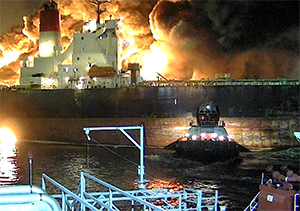Investigators believe a “momentary abnormality” in a critical engine component caused a fiery 2016 tanker allision near Houston.
Two Houston Pilots were guiding the 810-foot Aframax River off a terminal in the Houston Ship Channel on Sept. 6 when the crew lost engine control. The tanker struck two mooring dolphins at about 0005, opening a gash in the port-side hull and rupturing a fuel tank.
Fuel ignited on the Panama-flagged ship and on the surface of the channel. With help from tugboat crews, the two Houston Pilots moved Aframax River away from other vessels and port infrastructure. Both pilots sustained minor burns as the fire spread, and 88,000 gallons of low-sulfur marine fuel entered the waterway. Damage to the tanker and other vessels totaled $1.5 million.
The National Transportation Safety Board (NTSB) said a flaw in the tanker’s main engine governor actuator system likely caused the incident.
“Investigators believe that the abnormality likely resulted from an electrical and/or mechanical failure of the system, which led to loss of engine control while the vessel was engaged in astern propulsion,” the NTSB said in an accident report.
The two Houston Pilots, Capts. Michael McGee and Michael Phillips, boarded the ship at about 2300 on Sept. 5 for outbound departure. The engine initially performed as expected as the conning pilot, McGee, issued commands to back the ship away from the terminal. Two Suderman & Young Towing Co. tugboats, Gasparilla and Jess Newton, assisted.
The first signs of trouble came just after midnight. McGee ordered dead slow astern, which corresponds to 30 rpm, but a few minutes later the second engineer noticed the tachometer at 80 rpm, even though the telegraph remained in dead slow astern. He alerted the bridge, where a helmsman saw a similar discrepancy.
“On hearing this information, the conning pilot immediately ordered ‘all stop,’” the NTSB report said. “The third officer acknowledged the order and placed the (engine order telegraph) in the stop position, but all on the bridge noticed that the rpm indicator was still showing 80 rpm and that the vessel’s astern movement was increasing.”
A minute later, McGee ordered the engine to dead slow ahead to counteract its backward movement. He followed with a series of additional commands, but the engine did not respond and the vessel kept moving astern. Tugboats tried to slow the ship without much success.
Aframax River was backing at about 3.5 knots when the chief engineer hit the emergency stop button. By then, the ship had no way of avoiding two mooring dolphins off the port side. The first contact occurred with the ship making 3.2 knots, and the second followed soon after.
“The second allision tore an approximately 30-foot-long opening on the ship’s port-quarter hull plating at frame 26, about 8 feet above the waterline near the centerline of the No. 2 fuel oil tank,” the NTSB said. “Marine gas oil (MGO) immediately began pouring out of the hull opening.”
According to the report, friction caused by the impacts to the ship’s hull caused heat that ignited the fuel. The fire spread to Aframax River’s main deck, and flames reached the port bridge wing where McGee stood during the allision.
Jess Newton took a position just forward of the superstructure and pushed full ahead to move the tanker away from the terminal. Heat from the encroaching fire melted the tug’s towline. Crew shut the doors and activated sprinklers aboard the tug.
Aboard Aframax River, crew mustered to prepare for firefighting. The chief mate pressed up the No. 1 port and starboard ballast tanks, creating a “water blanket” 15 to 18 inches deep that ran aft across the cargo deck, the report said. Fireboats and additional tugboats with firefighting capability soon arrived, and the flames were extinguished at about 0118.
With McGee conning the vessel during the incident, Phillips oversaw the firefighting response. Phillips told investigators the harbor tug crews deserved special recognition.
Phillips and McGee received numerous honors for their roles in preventing a catastrophe, including the International Maritime Organization’s Exceptional Bravery at Sea award. The Coast Guard conveyed Meritorious Public Service awards to the men, and they received the Plimsoll Award for Outstanding Service from Professional Mariner.
The NTSB praised the two pilots and crewmembers aboard Aframax River as well as the crews of assist tugs. Their collective actions “successfully prevented the spread of fire to other vessels and structures.”
Investigators and representatives from the classification society ClassNK and engine maker Diesel United tried to pinpoint the failure that preceded the incident, but test after test yielded nothing. Similar tests on the main engine control system and governor made by Nabtesco Marine Control Systems Co. also found nothing unusual.
“The technicians concluded that the governor actuator system had encountered a momentary abnormality, one which they could not replicate,” the NTSB said, noting that Nabtesco replaced the governor actuator and other components as a precaution.

